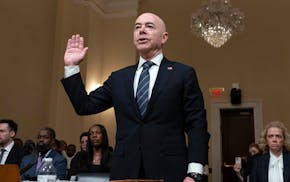WASHINGTON — President Barack Obama intends to nominate two lawyers with government experience to become commissioners on the Federal Election Commission, the agency that oversees and enforces campaign finance laws. One of the nominees would fill a Democratic vacancy on the commission and the other would replace the Republican vice chairman, the White House said.
Obama's nominee to replace Republican Donald F. McGahn is Lee Goodman, who served as a top aide to former Republican Gov. Jim Gilmore of Virginia. Obama's Democratic nominee is Ann Ravel, the chair of the California Fair Political Practices Commission. She would fill the seat vacated earlier this year by Cynthia Bauerly.
If confirmed by the Senate, the FEC would have all of its six commissioners — three Democrats and three Republicans.
The even partisan split on the FEC has at times contributed to gridlock on the commission with votes breaking along party lines.
Advocates of tighter campaign finance laws applauded Ravel's nomination Friday. While she was chair, the California Fair Political Practices Commission last year sued an Arizona nonprofit group for failing to divulge the source of money it used to fight a tax initiative proposed by California Gov. Jerry Brown. Under orders from the state Supreme Court, the group ultimately revealed that two conservative groups were behind its $11 million campaign.
"Ann Ravel has led an effort in California to shed light on secret money in California elections and has demonstrated a commitment to effective enforcement of campaign finance disclosure laws," said Fred Wertheimer, president of Democracy 21, a group that advocates changes in campaign finance law.
Goodman himself played a significant role in a case that was closely watched by campaign finance observers. He defended a donor to Hillary Rodham Clinton's 2008 presidential campaign who was accused of reimbursing donors with money from his corporation, a violation of the law. Goodman argued that a ban on corporate donations was unconstitutional. Goodman won at the lower court level, but a federal appeals court upheld the corporate contribution ban and the Supreme Court declined to review that decision, leaving the ban in place.
At issue was the Supreme Court decision in the campaign finance case known as Citizens United, which permitted unlimited corporate and union money to be used in politics, but not in direct donations to parties or candidates.
"Citizens United was a sea change in First Amendment jurisprudence and renders the absolute ban on limited corporate contributions unconstitutional," Goodman said when he won the lower court decision in 2011.
Goodman's stance in that case is likely to please supporters of a less restrictive campaign finance system and, likewise, draw scrutiny from critics of the Citizens United decision.
Advocates of tighter campaign laws have long criticized McGahn, arguing that he has led FEC's Republican bloc to thwart enforcement of campaign laws. McGahn has argued that he has tried to prevent the FEC from becoming an activist agency in its interpretation of the law.
In a statement Friday, he said: "Finally, President Obama has submitted FEC nominees to the Senate for consideration. As many well know, I have long desired to leave, but committed to stay to prevent the FEC from further trampling on our First Amendment and due process rights. I am pleased that a willing and capable successor has been vetted and nominated, and look forward to returning to practice law in the future."
Climate change concerns grow, but few think Biden's climate law will help, AP-NORC poll finds
